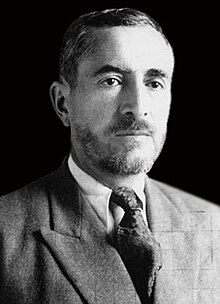Qazi Muhammad
Qazi Muhammad | |
|---|---|
| قازی محەممەد Qazî Mihemed | |
 | |
| President of the Republic of Mahabad | |
| In office 22 January 1946 – 15 December 1946 | |
| Preceded by | Office created |
| Succeeded by | Office abolished |
| Personal details | |
| Born | 1 June 1893 Mahabad, Persia |
| Died | 31 March 1947 (aged 53)[1] Mahabad, Iran |
| Citizenship | Iranian |
| Nationality | Kurdish |
| Political party | PDKI |
| Children | Efat and Ali Qazi, Pavin Qazi |
| Profession | Lawyer |
Qazi Muhammad (Kurdish: قازی محەممەد / Qazî Mihemed, Persian: قاضی محمد; 1 May 1893 – 31 March 1947[1]) was an Iranian Kurdish leader who founded the Democratic Party of Iranian Kurdistan and headed the short-lived, Soviet-backed Republic of Mahabad. He was hanged by the Pahlavi dynasty for treason in 1947.[2]
Biography[]
Qazi Muhammad was born into a noble Kurdish family from Mahabad.[3] His father had cooperated with Ismail Shimko during his revolt against the Iranian government in the 1920s, and his brother Sadr Qazi was a member of the Iranian parliament.[4] After his father's death, he was nominated as a judge in Mahabad in the 1930s.[5] Qazi Muhammad later became a member of the Komala Zhian I Kurd, a leading Kurdish organization in Iran at the time supported by the Soviets, in April 1945.[6] Soon after he became its leader.[3] Muhammad acted as the President of the Republic of Mahabad, which was founded in January 1946, and declared publicly in March of the same year.[7] He was also the founder of the Kurdish Democratic Party of Iran, that was established after the need for a more transparent party was felt by its adherents. (Komeley Jiyanewey Kurd existed prior to that, as a secret organization.) Mustafa Barzani, one of the leaders of the nationalist Kurdish movement in Iraqi Kurdistan, was also the commander of its army. His cousin, Mohammed Hossein Saif Qazi, was a minister in his cabinet. In April 1946, with the support of the Soviets, Muhammad signed a peace treaty with Ja'far Pishevari of the Azerbaijani republic in which they exchanged assurances that the Azerbaijani and Kurdish minorities rights in each republic would be preserved.[8] A year later, after the Soviets withdrew from Iran, the socialist Kurdish Republic was crushed by Iran's central government.
Family[]
One of his sons, , is today an active member in the Kurdish movement. One of his daughters, Efat Ghazi, was killed by a letter bomb in Västerås, Sweden, in 1990.[9] The bomb was addressed to her husband, the Kurdish activist Emir Ghazi.[10] Some analysts speculated that the Iranian government might have been involved in the assassination.[11][12]
See also[]
- Timeline of Kurdish uprisings
- Abdul Rahman Ghassemlou
- Sadeq Sharafkandi
- Simko
References[]
| Wikimedia Commons has media related to Qazi Muhammad. |
- ^ a b McDowall, David (2004). A Modern History of the Kurds (3rd ed.). I.B.Tauris. p. 245. ISBN 9781850434160.
- ^ Portal, Kurdistan (2008-12-20). "Das Vermächtnis des kurdischen Märtyrers Qazi Mohammed". Kurdmania (in German). Archived from the original on 2011-07-27. Retrieved 2009-02-22.
- ^ a b Jwaideh, Wadie (2006-06-19). The Kurdish National Movement: Its Origins and Development. Syracuse University Press. p. 249. ISBN 978-0-8156-3093-7.
- ^ Entessar, Nader (1992). Kurdish Ethnonationalism. Lynn Rienner Publishers. pp. 18–21. ISBN 978-1-55587-250-2.
- ^ Jwaideh, Wadie (2006-06-19), p. 250
- ^ Jwaideh, Wadie (2006), pp.247–248
- ^ Jwaideh, Wadie (2006), p. 252
- ^ Entessar, Nader (1992). Kurdish Ethnonationalism. Lynn Rienner Publishers. p. 21. ISBN 978-1-55587-250-2.
- ^ Fälth, Gun (1990-09-07). "Kvinna sprängd till döds" (in Swedish). Dagens Nyheter.
- ^ Westmar, Bo (1990-09-07). "Bomben var avsedd för maken" (in Swedish). Dagens Nyheter.
- ^ Rahimi, Babak (2002-11-19). "Offer för Irans dödspatruller" (in Swedish). Mana. Retrieved 2007-12-30.[dead link]
- ^ Darvishpour, Mehrdad (2003-09-30). "Säpo skyddar Irans flyktingspioner". Svenska Dagbladet (in Swedish). Retrieved 2007-12-30.
- 1893 births
- 1947 deaths
- Democratic Party of Iranian Kurdistan politicians
- Executed Kurdish people
- Kurdish nationalists
- Executed Iranian people
- People executed by Iran by hanging
- People executed by Pahlavi Iran
- People executed for treason against Iran
- Kurdish independence activists